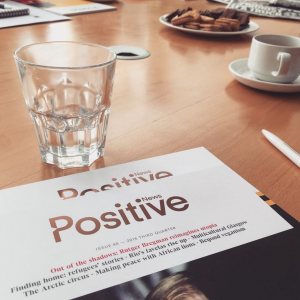by Sian Williams @sianylouu
I’ve actively avoided the news for as long as I can remember. I’m the type of person who averts negativity at all costs – I have ‘positive quote’ boards galore on my Pinterest and preach the power of positivity to my friends so much so they’ve started calling me the ‘positivity fairy’! It’s not that I don’t want to know what’s going on in the world, it’s just – like so many others – I’m sick to death of hearing about what’s going wrong with the world. So when I was asked to attend Positive News’ Constructive Journalism course on behalf of Podium.me, I was excited that actions were being taken to shape the news as we know it.
I’d not heard of Positive News before and I won’t go in to too much detail (because we all have Google) but in short, it’s a ‘constructive journalism magazine’ that reports ‘with a focus on progress and possibility’. Imagine a magazine that looks at the amazing progress we are making around the world. Instead of reporting the wholly negative, Positive News might look at solutions to global challenges and how we can move forward from them. Their second quarter (2016) edition contains articles surrounding body positivity, the future of clean energy and alternative approaches to the failed ‘war on drugs’. It’s a complete breath of fresh air.
It was an intimate (around 10 of us), seminar-style day session of brainstorms and discussions. I learnt invaluable lessons about the nature of the news, the media industry and how both of these shape the way we view the world. These lessons aren’t solely useful to journalists alone (I don’t consider myself a journalist at all!) but are widely transferrable and useful to anyone interested in our human potential, progress and the future – so I hope this might benefit you too, in some way.

Constructive Journalism is defined as ‘rigorous, compelling reporting that includes positive and solution-focused elements in order to empower audiences and present a fuller picture of truth, while upholding journalism’s core functions and ethics.’ (http://constructivejournalism.org/about/) When looking at ‘constructive journalism’, it helps to look at the news as we know it. We watch/read about shocking events in the news day-in and day-out, such events are normalised, we become used to them and de-sensitised, the news is exaggerated/becomes even more shocking, we are de-sensitised further… and the cycle continues.
During the course, Jodie Jackson, a psychologist and associate of the Constructive Journalism Project, gave a presentation about the impact that this kind of negative news has on our mindset. Jodie explained that, not only does negative news affect us psychologically by triggering feelings of anxiety, sadness and helplessness, but behaviourally and socially it encourages feelings of contempt, anger and hostility. If we begin to think of the world as a dangerous, scary place full of risk, we are less likely to be trusting and compassionate towards others, which has a whole host of negative implications.
To fully grasp how the news is shaping our world view, Jodie spoke about a recent episode of the ‘Secret Life of 6 Year Olds’ on Channel 4 (a series that studies how young children interact with each other). In Episode 6, the children can be seen role-playing as news broadcasters. The news stories that they report (though only make-believe) are about international terrorism and violence – “there was a train attack on a French train to Paris. They got the knife and got the guard and stabbed them.” We see this kind of news on a daily basis, as do our children. So how is this shaping their view of the world? (Watch the clip here: https://www.youtube.com/watch?v=SLXGuonEi0k)
One thing the course clarified is that constructive journalism isn’t just positive, happy news stories or ‘fluff’ as they called it. It doesn’t mean ignoring all the terrible things that are happening in the world. Instead, it’s news that focuses on solutions and progress – stories that ask what next? and how can we grow from this? It’s reporting the news in a way that inspires and motivates us to take action, to be more active in our society; a type of journalism that makes us want to engage, instead of disengage with the events around us. This is why constructive journalism is so important and it seems now, more than ever, there is a need for it.
At the beginning of the course, we drew a mind map of ‘how the news makes us feel’. Common key words were powerless, anxious, sad, angry, confused…You get the idea. Constructive journalism aims to leave the reader inspired, motivated, informed and empowered. As the next generation of journalists, creators and leaders, it’s important to remember that the news, the media and the messages we are sending out are shaping our world view, and ultimately our world. If we keep sending out negative messages, our world view and perspective will be negative. If we can begin to inspire feelings of hope, empowerment and change, maybe the next generation of six year olds will have a kinder world to re-enact.
Blog: http://www.theadventurethatislife.co.uk
YouTube: http://www.youtube.com/c/SianLouiseVlogs

